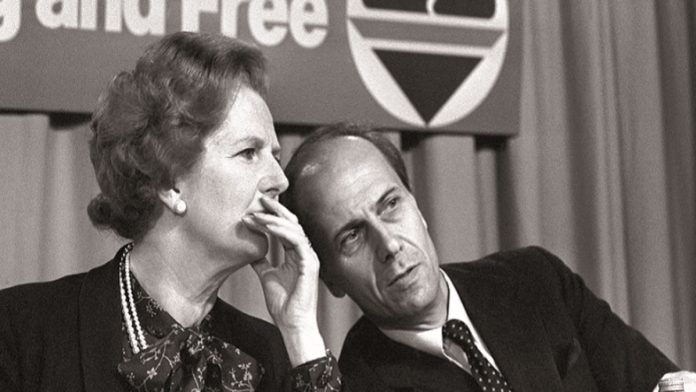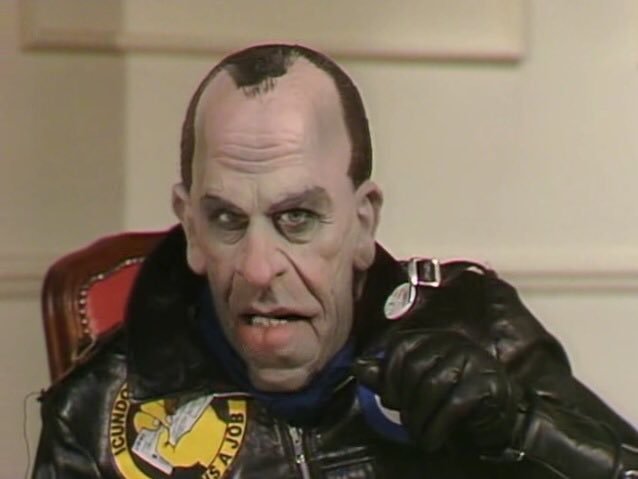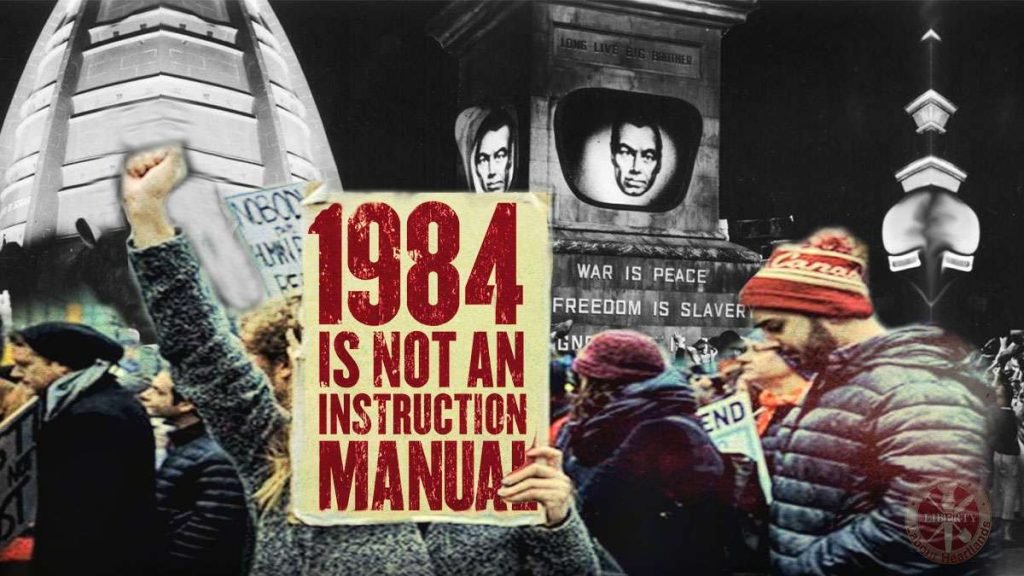
The Tory peer Norman Tebbit’s admitted that he received regular briefs from special branch on the activities of trade unionists while he was a minister.
Norman Tebbit was one of Margaret Thatcher’s most fanatical disciple’s he opposed Labour and the trade unions with such zeal that he was once likened to a “semi-housetrained polecat”.
This came about during a debate in Parliament on 2 March 1978, Michael Foot labelled Tebbit a “semi-house-trained polecat” in response to a question from Tebbit asking if he accepted that the legislation being proposed that made it compulsory for people to join a Trade Union was an act of Fascism.
When he was made Lord Tebbit in 1992, he chose a polecat as one of the symbols on his coat of arms. Later, in the debate, Tebbit asked Foot whether he would “put a bridle on his foul-mouthed tongue”
For many Tebbit along with Thatcher symbolised the nasty arrogance of the Tory party both overcompensating in their ruthlessness, both trying to impress on their party they belonged.
in the 1980s. He was depicted as a leather clad skin head who dished out tough love to members of Margaret Thatcher’s cabinet who didn’t tow the party line.
I was Margaret Thatcher’s minder, her enforcer

There is something very sinister about Tebbit’s admission, from it we can be certain that not only was the state spying on us then, that we have no doubt they are now! While still to come is the invasion and the attacks on our libities and privacy, legally this time through the #Spycops bill. Along with the Police Crime Sentencing and Courts Bill it does seem we are leaving our democracy behind and entering a state of Authoritarianism.
The fact the #Spycops bill was passed without opposition by Starmer is one of the most frightening aspects of this parliament and does not bode well for our liberties and freedoms in times to come.

This was not a confession, but a boast!
The former employment secretary, a senior figure in Margaret Thatcher’s government, said the information was so detailed that he knew where trade unionists had gone on holiday.
He was speaking during a parliamentary Zoom meeting on Tuesday, hosted by Labour MP Richard Burgon to discuss the ongoing Undercover Policing Inquiry.
Tebbit’s admission that he received regular briefs from special branch on the activities of trade unionists while he was a minister was said in a gloating manner. Richard Bergan MP stated:
“To Mr Tebbit this was not a confession, but a boast – something that, as a key Thatcherite and top Tory, he believes was a good thing.”
The probe, which is investigating abuses by officers in two secret police units, is also seeking to determine the extent to which spycops targeted and infiltrated trade unions and what was done with the intelligence gathered, including whether it was used for blacklisting.
All MPs and peers are free to attend such Zoom meetings, but Lord Tebbit’s presence surprised many.
Replying to a contribution by Blacklist Support Group’s Dave Smith, the Tory peer also revealed that he had held private talks with a former general secretary of the now-defunct electricians’ union EETPU about how to tackle left-wing trade unionists in the movement.
The EETPU, which is now part of Unite, was expelled from the TUC following its role in undermining the print unions in the Wapping dispute of 1986.
“Tebbit revealed what many of us had suspected for years: that senior officials in [the EETPU] had been colluding with the Tories and the British state security services to effectively spy on other trade unionists,” Labour MP John McDonnell, who attended the meeting, told the Morning Star.
“It was disgraceful treachery and betrayal of our movement, but not unexpected given the way in which the leaders of this union had done all they could to undermine working-class struggle in our country.”
Unite has called for Lord Tebbit’s admissions to be fully investigated, claiming they reveal the “first definite link” between undercover police officers and the government.
“This is why we are so gobsmacked over it,” Mr Smith told the Star. “For the last 10 years we’ve been doing this campaign, one of our key questions is, if the police were doing this … how high up the chain did it go?
“And clearly [Mr Tebbit] has been the first who has broken ranks and said: ‘Yes I was a member of the Cabinet and I was getting information supplied to me about union members’.”
Responding to the revelations, Unite said Lord Tebbit’s comments also raise further questions as to whether other secretary’s of state received similar briefings.
Unite assistant general secretary Howard Beckett said: “In the first instance the Mitting’s Inquiry into undercover policing has a clear duty to investigate exactly what information was passed to the government, about whom and for how long.
“Former ministers including Norman Tebbit need to account for their actions and explain why they approved of spying on entirely lawful organisations.”
Mr Beckett described the alleged collusion between the EEPTU and Lord Tebbit as “equally disturbing” and said that any official found to have colluded with blacklisters would be “subject to the union’s disciplinary process.”
Replying to a contribution by Dave Smith, of the blacklist support group, Mr Tebbit said that the level of briefing he received from the police was so detailed that he knew where trade unionists went on holiday.
Lord Tebbit also revealed that he held meetings with the general secretary of the electricians union EEPTU to discuss how to deal with “activists”. When Tebbit was secretary of state for employment from 1981-83, the leader of EEPTU was Frank Chapple.
Blacklisting
Following the discovery of the Consulting Association blacklist of construction workers in 2009, it was revealed that information on some workers could have only have been supplied by the police or the security forces.
The subsequent revelations about the undercover police organisation, the Special Demonstration Squad (SDS), and the way in which it infiltrated and spied on many Left-wing organisations including trade unions, provided further evidence that information they obtained was used to blacklist trade unionists.
Lone wolf?
Lord Tebbit’s revelations raise further questions about whether he was the only secretary of state to receive such briefings from special branch on trade unionists and how that information was obtained.
It is also vital to discover whether his Conservative successors in the role, Tom King, Lord Young, Norman Fowler, Michael Howard, Gillian Shepherd, David Hunt and Michael Portillo and members of the Blair government in similar positions received such briefings. It also needs to be clarified if such briefings still occur today and how the information is obtained.
Unite has commissioned a barrister to fully investigate allegations of collusion of union officials into the blacklisting of construction workers. The union has secured £21.24 million in compensation for 465 workers who were blacklisted by the Consulting Association.
Workers spied on
Unite assistant general secretary Howard Beckett said: “Norman Tebbit’s shocking revelations have confirmed what trade unionists have always suspected: Not only were they spied on by undercover police information but that information was passed onto the highest levels.
“In the first instances the Mittings Inquiry into undercover policing has a clear duty to investigate exactly what information was passed to the government, about whom and for how long.
“Former ministers including Norman Tebbit need to account for their actions and explain why they approved of spying on entirely lawful organisations.
“The revelations on the collusion between a leader of EEPTU and Tebbit are equally disturbing. Unite has already instigated a barrister led investigation into concerns about potential collusion between officials and blacklisters, any official found to have acted in this manner will be subject to the union’s disciplinary process.”
Public Inquiry
Unite assistant general secretary Gail Cartmail said: “Norman Tebbit has revealed the first definite link between undercover police officers, the government, employers and the blacklisting of construction workers.
“It is absolutely essential that a full public inquiry is held to finally reveal the full truth behind blacklisting to reveal who was involved in ruining the lives of thousands of construction workers.”
Support Independent Journalism Today
Our unwavering dedication is to provide you with unbiased news, diverse perspectives, and insightful opinions. We're on a mission to ensure that those in positions of power are held accountable for their actions, but we can't do it alone. Labour Heartlands is primarily funded by me, Paul Knaggs, and by the generous contributions of readers like you. Your donations keep us going and help us uphold the principles of independent journalism. Join us in our quest for truth, transparency, and accountability – donate today and be a part of our mission!
Like everyone else, we're facing challenges, and we need your help to stay online and continue providing crucial journalism. Every contribution, no matter how small, goes a long way in helping us thrive. By becoming one of our donors, you become a vital part of our mission to uncover the truth and uphold the values of democracy.
While we maintain our independence from political affiliations, we stand united against corruption, injustice, and the erosion of free speech, truth, and democracy. We believe in the power of accurate information in a democracy, and we consider facts non-negotiable.
Your support, no matter the amount, can make a significant impact. Together, we can make a difference and continue our journey toward a more informed and just society.
Thank you for supporting Labour Heartlands











